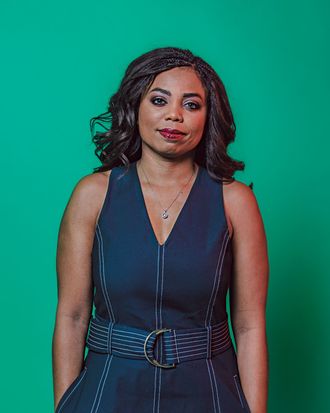
On the afternoon of the Alabama Senate election, Jemele Hill is sitting in a makeup chair at ESPN headquarters. She’s getting ready for her job as co-host of the 6 p.m. SportsCenter but thinking about politics. “What was Nick Saban’s responsibility?” Hill asks, referring to the head football coach at the University of Alabama, the most famous man in the state, who had offered no opinion on the Senate race. “Considering that one of the candidates has said some ignorant and pointed things about African-Americans, and with [Saban] having mostly black players, did he bear some responsibility to speak up?”
The responsibility to speak up has been on Hill’s mind. Several months ago, Hill tweeted that President Trump was “a white supremacist who has largely surrounded himself w/ other white supremacists” and “the most ignorant, offensive president of my lifetime.” Neither statement was especially controversial in the liberal Twittersphere, but they were a surprise coming from the host of a nightly sports show. White House press secretary Sarah Huckabee Sanders declared Hill’s comments “a fireable offense,” and the president later inducted Hill into the “special club,” as Hill puts it, of people personally targeted by @realDonaldTrump: “With Jemele Hill at the mike, it is no wonder ESPN ratings have ‘tanked,’ in fact, tanked so badly it is the talk of the industry!”
“2017 has been the most surreal year of my career,” says Hill. With her braids pulled out into shoulder-length curls, she makes her way to the SportsCenter studio wearing furry Uggs and a puffy jacket over a navy knee-length dress. It’s snowing in Bristol, the Connecticut exurb where ESPN has isolated itself since its founding, so Hill walks through the numerous skywalks connecting the 18-building campus.
As Hill passes several ESPN radio studios, Michael Collins, a golf commentator, pops out and yells after her. “Jemele!” Collins says. “Do I gotta cancel my Facebook rants?”
“Let me preemptively apologize,” Hill replies with a smile. “I’m sorry I fucked up for everybody.”
Collins is referring to “Talent Gathering 2017,” a company meeting to be held the next day, meant to address ESPN’s woes, which were many even before the shocking resignation on December 18 of John Skipper, the company’s well-regarded president, who cited a substance-abuse problem. But the gathering was also meant to give executives a chance to brief employees on the company’s new code of conduct for ESPN commentators regarding talking politics on Twitter — a policy that was amended after Hill’s battle with the president. (Read whatever symbolism you want into the fact that the lecture was held in the day-care center.)
Hill never intended to become a political icon. A self-described tomboy, she grew up playing fast-pitch softball and loved the Detroit Tigers. Her new Twitter following, which has doubled since her spat with the White House, may have been confused that a recent exclamation of “YASSSSSSS!!!!!!” was not in response to a viral clip of Elizabeth Warren but the announcement that former shortstop Alan Trammell, who won a World Series with the Tigers in 1984, was being inducted into the Baseball Hall of Fame. She never considered any job besides sportswriter, though she has long been willing to express her opinion beyond the field: At Michigan State, she wrote a column arguing that reverse racism against white people doesn’t exist and another criticizing black people’s support of Mike Tyson and O. J. Simpson as misguided. “Black, white, frats, sororities — I was pissing off everybody,” Hill says. When she became a columnist for the Orlando Sentinel in 2005, she was the only black female sports columnist in North America. (She fears the rise of new digital outlets like Barstool Sports has only made the problem worse for young black female journalists: “They’ve created a young boys’ network that will eventually be an old boys’ network.”)
“I come bearing gifts,” Hill says, walking into SportsCenter’s news meeting carrying several Christmas sweaters, including one with a gold Wu-Tang logo across the chest, then handing them to one of her producers, who needs them for a party. A year earlier, on their old show, she and Michael Smith, her co-host, had worn a variety of Christmas sweaters (Marvel heroes, Chevy Chase) for two weeks straight. It was their irreverent chemistry — the combination of their abilities to dissect the Tampa 2 defense while quoting Migos lyrics — that prompted ESPN to tap them in an effort to reinvigorate the 6 p.m. SportsCenter, which previously was centered on showing that day’s highlights to fans but is now available any time on a smartphone. Hill and Smith became the first African-American duo to co-host SportsCenter, and, last December, ten months before Hill was condemned by the White House, they were invited to a Christmas party there. “Henny in the White House,” Hill said in an Instagram video, sipping Hennessy with Smith in the waning days of the Obama administration. “They won’t have this back for a while.”
At the production meeting, Hill nurses a large Starbucks coffee while producers pitch ideas and inadvertently reveal one of the problems with daily sports shows: There often isn’t much to talk about. One producer suggests doing a piece on a Major League Baseball umpire — in December. “There are times when certain things are happening in this world, and I’m like, I truly couldn’t care less about Jerry Jones’s fight with Roger Goodell,” Hill says.
Hill’s social-media output was a mix of funny sports videos, memes, and the occasional post about a social or political issue, none of which caught much attention until the Trump incident. “I didn’t think I was announcing anything, frankly, that other people hadn’t said,” Hill says. But her tweets dovetailed with a growing narrative that ESPN had developed a “leftist bias,” as Breitbart put it. “Everybody walking around here smoking weed and talking about hippie-ism — that’s what they think ESPN has become,” Hill says. In reality, casual conversation at ESPN centers almost entirely on, well, sports, and it had been the president who consistently brought politics into sports. “The only commentary Barack Obama had about sports was picking his national champion every year,” Hill says. “George W. Bush was the same thing — we knew he was a big baseball fan, he would throw out the first pitch, that was it.”
Several weeks later, ESPN suspended Hill for two weeks for another pair of tweets in which she suggested that fans could support protesting NFL players by boycotting the NFL’s sponsors. (ESPN has a $1.9 billion annual contract with the NFL and depends on the same carmakers and beer brewers for ad revenue.) She avoided social media during her suspension, but came back to a pile of hate mail that continues to accumulate: In the ESPN cafeteria, Hill pulls up a recent Facebook message on her phone in which a stranger calls her a “DUMB FUCKING N****R.” (There were also notes of support: Hill says President Obama passed along encouragement through a mutual acquaintance.) Instead, she spent her suspension binge-watching Dear White People and taking meetings in Los Angeles for a new production company she started with a friend to produce TV and digital series targeting African-American women.
For now, she’s back hosting Sports-Center, albeit with a much bigger profile. “It was Sinatra who said, ‘You’re nobody until somebody loves you,’ and it was Biggie who said, ‘You’re nobody till somebody kills you,’ ” Smith says, standing in one of the skywalks after taping SportsCenter with Hill. “I guess in 2017 you’re nobody until Trump attacks you.”
*This article appears in the December 25, 2017, issue of New York Magazine.






























